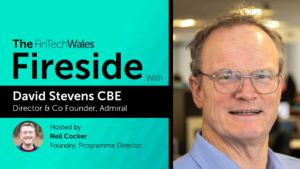The FinTech Five – 4th February 2022
04 February, 2022

Welcome to the FinTech Five, the part of the week where we take a closer look at the best articles, news, and features from over the past week from our FinTech Wales members.
1. FinTech Wales Fireside – David Stevens CBE, Admiral Co Founder & Director

First this week, as part of the FinTech Wales Fireside series and to celebrate Season 2 of the Foundry Accelerator Programme, FinTech Wales are delighted to welcome David Stevens, Co- Founder and Director of Admiral PLC for an evening of insightful discussion in front of FinTech Wales members and the supporting ecosystem.
David co-founded Admiral in 1991 and has had an immeasurable impact on the Group. He has contributed enormously to all the elements that make Admiral so special and successful, including underwriting, product innovation, the unique Admiral culture and much more.
The evening will be accompanied by free drinks, snacks and the opportunity to connect and network with members afterwards.
The event will be taking place next Wednesday 9th February 2022, 18:00 – 20:00 GMT.
Click here to register your free ticket for the event.
2. Delio release insight into the growth of private markets and alternative assets: what it means for wealth management

Next, David Newman, Delio’s chief commercial officer and co-founder, explored the ‘what, why and how’ of private markets for wealth managers at Octopus Investments’ recent breakfast briefing and explained how offering their clients access to these assets was fast becoming an essential, rather than optional, part of their strategy.
Delio’s most recent blog summarises David’s insights into the following topics and questions concerning the growth of private markets and alternative assets:
- The challenges facing wealth managers
- Why are alternative assets generating so much interest?
- Why aren’t all wealth managers offering access to private markets?
- Is 2022 the year that private markets become a mainstream product?
Click here to read the full insights on Delio’s website.
3. NextGen Planners Podcast: Simple financial planning features CashCalc’s Ray Adams

Next this week, the latest episode of the NextGen Planners Podcast, hosted by Dan Graham, features Chartered Financial Planner and founder of CashCalc, Ray Adams.
Within the 1-hour session, they discuss why simplicity is such a key factor for a financial adviser, the importance of cashflow modelling and how best to use it with clients, the evolution of client onboarding and digital engagement, plus much more.
To listen to the podcast, please visit:
- Youtube: youtu.be/9Dc1pISX4zc
- Spotify: spoti.fi/3AHVzAJ
- Apple: apple.co/3ot5CoL
4. Wealthify CEO, Andrew Russell, discusses working with IFA networks and firms in recent article from Ruby Hinchliffe at FTAdviser

Next, in a recent article from Ruby Hinchliffe at FTAdviser Wealthify CEO, Andrew Russell, discusses working with IFA networks and firms.
“Wealthify boss Andy Russell has said his fintech is “not competing against IFAs” but helping them, as the firm concentrates on small pot consolidation in tandem with third party advisers.
The Aviva-owned online investment service, which targets savers who don’t want to self-select investments, started working with IFAs back in September 2020, signing two co-branded partnerships with network SimplyBiz and the UK advice arm of LGT Vestra.
Having built the company up through its direct-to-consumer channel, Wealthify decided to expand into the IFA market to reach more savers with smaller pots – typically those with £50,000 or less in savings at a flat fee of 0.6 per cent.
The Cardiff-based firm’s partnerships with SimplyBiz and LGT Vestra work like “incubation relationships”, according to Russell.
“They [advice firms] refer the small pots to us and we help them grow. And then we give them some MI [management information] on a regular basis. So when [the customer] gets to a certain size they will consider whether they want to go back [to the IFA] or not.”
Wealthify is not regulated to provide financial advice. It also doesn’t allow customers to consolidate pensions with lock-ins, guarantees or defined benefits. This includes pensions with a protected pension age or scheme specific tax-free cash protection.”
Click here to read the full article on FTAdviser’s website.
5. W2’s latest blog sees Business Development Manager Gareth Lloyd investigate ‘Manual Onboarding: A Process of The Past?’

Last but not least this week, W2’s latest blog sees Business Development Manager Gareth Lloyd investigate ‘Manual Onboarding: A Process of The Past?’
The article reads: “When it comes to providing customers with a positive onboarding journey, I believe that automation is key. But in 2022, many regulated businesses are still looking to manual checking when onboarding customers and performing necessary checks to comply with various regulations. At W2, our core business model is to provide our customers with all of the tools needed to not only adhere to ever-changing regulations but ensure their customers experience a slick and efficient onboarding journey. So, is manually onboarding customers really a process that needs to be left in the past?”
Cost
One of the main indicators as to why manual onboarding should be used less is down to cost. When looking to use solely human intervention for onboarding you would need a lot more resource to verify customer identities, particularly in bigger businesses where the volume of customers being onboarded daily is significant.
Speed
The second reason why manually onboarding customers is no longer fit for purpose is speed. With technology constantly evolving, people now want instant access to services.
Mistakes
It is inherently part of what makes us human that mistakes can be made. But when it comes to operating in a regulated industry where the risk of money-laundering and fraud is constantly rising, mistakes are simply not acceptable.
Manual + Automated Is The Golden Ticket
Despite the clear need for some automation within regulated onboarding, that doesn’t mean that manual intervention should be completely avoided.
Click here to read the full blog on W2’s website.
Until Next Week
And that’s it for the FinTech Five this week. Thank you for reading, and don’t forget to join us next week for more of the best content from across our FinTech Wales membership.